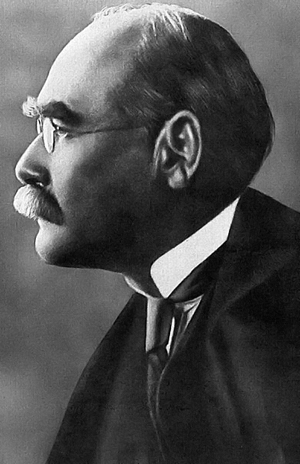Sussex
Rudyard Kipling
GOD gave all men all earth to love,
But since our hearts are small,
Ordained for each one spot should prove
Belovèd over all;
That, as He watched Creation’s birth,
So we, in godlike mood,
May of our love create our earth
And see that it is good.
So one shall Baltic pines content,
As one some Surrey glade,
Or one the palm-grove’s droned lament
Before Levuka’s Trade.
Each to his choice, and I rejoice
The lot has fallen to me
In a fair ground—in a fair ground—
Yea, Sussex by the sea!
No tender-hearted garden crowns,
No bosomed woods adorn
Our blunt, bow-headed, whale-backed Downs,
But gnarled and writhen thorn—
Bare slopes where chasing shadows skim,
And, through the gaps revealed,
Belt upon belt, the wooded, dim,
Blue goodness of the Weald.
Clean of officious fence or hedge,
Half-wild and wholly tame,
The wise turf cloaks the white cliff edge
As when the Romans came.
What sign of those that fought and died
At shift of sword and sword?
The barrow and the camp abide,
The sunlight and the sward.
Here leaps ashore the full Sou’west
All heavy-winged with brine,
Here lies above the folded crest
The Channel’s leaden line;
And here the sea-fogs lap and cling,
And here, each warning each,
The sheep-bells and the ship-bells ring
Along the hidden beach.
We have no waters to delight
Our broad and brookless vales—
Only the dewpond on the height
Unfed, that never fails—
Whereby no tattered herbage tells
Which way the season flies—
Only our close-bit thyme that smells
Like dawn in Paradise.
Here through the strong and shadeless days
The tinkling silence thrills;
Or little, lost, Down churches praise
The Lord who made the hills:
But here the Old Gods guard their round,
And, in her secret heart,
The heathen kingdom Wilfrid found
Dreams, as she dwells, apart.
Though all the rest were all my share,
With equal soul I’d see
Her nine-and-thirty sisters fair,
Yet none more fair than she.
Choose ye your need from Thames to Tweed,
And I will choose instead
Such lands as lie ’twixt Rake and Rye,
Black Down and Beachy Head.
I will go out against the sun
Where the rolled scarp retires,
And the Long Man of Wilmington
Looks naked toward the shires;
And east till doubling Rother crawls
To find the fickle tide,
By dry and sea-forgotten walls,
Our ports of stranded pride.
I will go north about the shaws
And the deep ghylls that breed
Huge oaks and old, the which we hold
No more than Sussex weed;
Or south where windy Piddinghoe’s
Begilded dolphin veers
And red beside wide-bankèd Ouse
Lie down our Sussex steers.
So to the land our hearts we give
Till the sure magic strike,
And Memory, Use, and Love make live
Us and our fields alike—
That deeper than our speech and thought,
Beyond our reason’s sway,
Clay of the pit whence we were wrought
Yearns to its fellow-clay.
God gives all men all earth to love,
But since man’s heart is small,
Ordains for each one spot shall prove
Beloved over all.
Each to his choice, and I rejoice
The lot has fallen to me
In a fair ground—in a fair ground—
Yea, Sussex by the sea!
Rudyard Kipling lived at Bateman's, a Jacobean House in Sussex from 1902 until the end of his life. He came to love the Sussex countryside.
The Long Man of Wilmington is the huge figure of a man, cut into the hillside of the South Downs above Wilmington.
Levuka is the Trade Wind that blows through the Fiji Islands. The capital of the Islands was also called Levuka.
The Weald is the fertile plain which lies between the lines of the North Downs and the South Downs which run along the south coast of England beside the English Channel to Beachy Head.
The downs have many hidden villages and churches such as West Dean and Folkington. The most likely "little lost church" is the tiny church at Lullington. It sits alone surrounded by fields and is only about 16 ft square. It is said to be the smallest church in England.
Main Location:
Sussex, England - East Sussex, UK
Other locations:
- Sussex, England - West Sussex, UK
- Long Man of Wilmington, East Sussex, England - Wilmington, Long Man, East Sussex, UK
- The Weald, East Sussex, England
- Piddinghoe, East Sussex, England - Piddinghoe, East Sussex, UK
- River Ouse, East Sussex, England - River Ouse, United Kingdom
- River Rother, East Sussex, England - River Rother, United Kingdom
